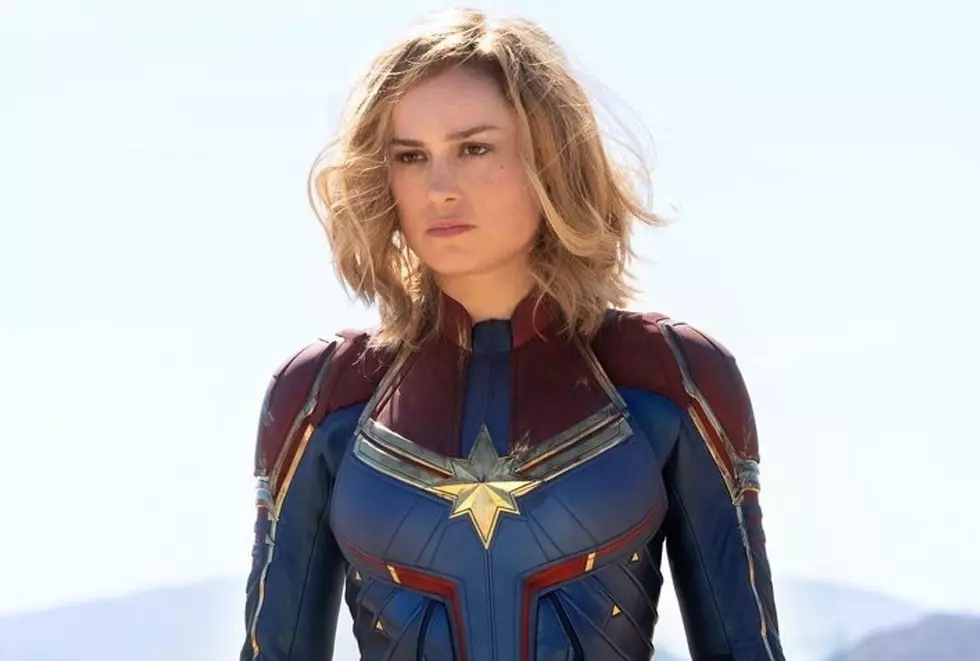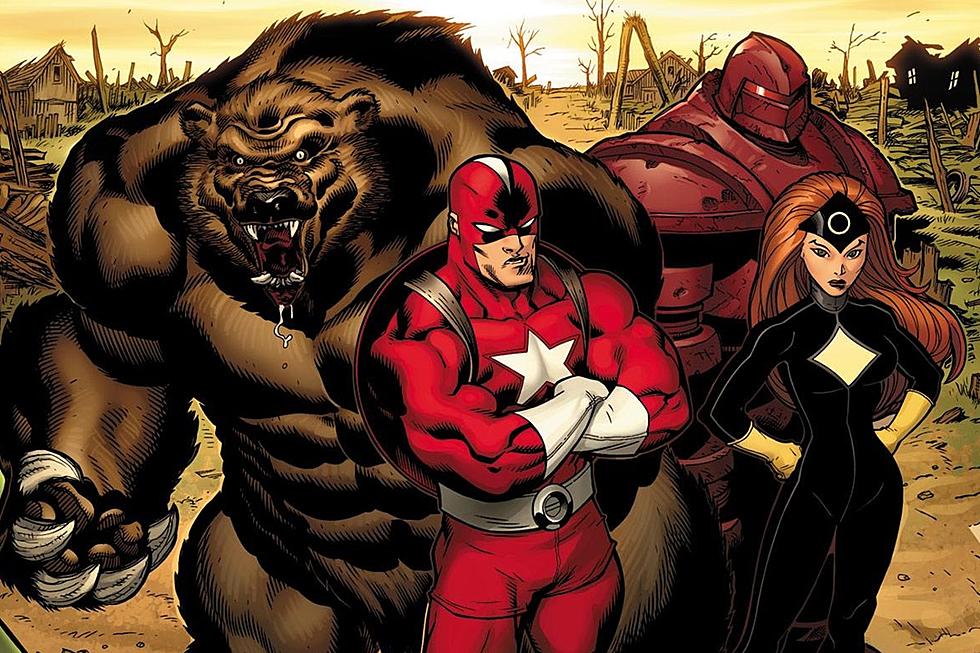
Oh Captain My Captain: How Carol Danvers Became Marvel’s Biggest Female Hero
Fans of Captain Marvel probably won't tire of being reminded that their hero is getting her own movie, scheduled for a July 6th 2018 release. There's no director, no writer, and no star attached, but the movie has a title and a date, and that alone is progress. Superhero fans have been waiting a long time for a Marvel Studios movie with a female lead.
The Captain Marvel movie is due to come out thirteen months after a planned 2017 Wonder Woman movie from Warner Bros., and those two pictures could help usher in a new age for female heroes, if the studios follow through.
The Wonder Woman movie was a long time coming, but she's an obvious choice for Warner Bros; she's the definitive female hero, a brand, and an icon, with more than seventy years of history. By contrast, Captain Marvel has been around in her current incarnation for two years. But there are good reasons why she's Marvel's pick for a leading lady.
The most obvious and least glamorous reason for Marvel to choose Captain Marvel is availability. Many of the publisher's biggest female heroes are tied up in the rights it sold to Fox during bankruptcy. Storm, Invisible Woman, Kitty Pryde, Rogue, and Jean Grey are among the best developed female heroes in comics, and they're all at Fox. (And Fox, of course, has failed to recognize the true value of any one of them.)
Sony Columbia's Spider-Man franchise is less of an obstacle, though the studio does plan to launch a female-led superhero movie of its own with an as-yet undisclosed female hero. That could mean Mary Jane, Black Cat, Silk, Silver Sable, and/or some variation on Spider-Woman, includig Spider-Gwen. That doesn't take too many A-listers off Marvel's plate, but Sony's claim to a version of Spider-Woman complicates Marvel's chances of making a movie based on Jessica Drew. She's not a derivative of Spider-Man, but her codename is.
Other female heroes would be tough to launch into movies because they're based on or built around male heroes, and the market and the culture always put the men first. All right-thinking people want to see a live action She-Hulk, but the character's indelible links to Hulk -- whose solo movies have twice failed to spark a franchise -- may hold her back.
Marvel Studios is unlikely to prioritize movies starring female heroes linked to successful male heroes either, such as Valkyrie, Sif, Agent 13, Rescue, or the new Thor. In other words, any female hero strongly tied to a male hero is going to be overshadowed if that male hero is a hit, and sidelined if he's a flop.
Then there are the female heroes that Marvel Studios sidelined for other, more perplexing reasons. The first three female Avengers were Wasp, Scarlet Witch, and Black Widow. The original Wasp, Janet Van Dyne, has reportedly been consigned to the backstory for the forthcoming Ant-Man movie, though a new character may take her place. Scarlet Witch will debut in next year's Avengers: Age of Ultron, but the fact that Fox also makes a claim to the character via its X-Men license may make her an unappetizing headliner for Marvel.
Black Widow should have a movie. The actor that plays her, Scarlet Johansson, is one of the biggest stars in Hollywood, and a proven draw as an action movie lead. Her co-starring role in Captain America: The Winter Soldier not only reestablished the appeal of the character, but also set the template for the type of grounded, espionage-fueled story she could lead. (Current series writer Nathan Edmondson even made a pitch to write it with the first six pages of a possible script on his website.) Yet Marvel Studios president Kevin Feige seems committed to the idea that Black Widow works best as a supporting player in Avengers, Iron Man, and Captain America movies. He's wrong, but he's the boss.
So who does that leave? Jessica Jones, Peggy Carter and Mockingbird have all been earmarked for Marvel's TV productions. Misty Knight probably sits right alongside them due to her connections to Iron Fist, just as Elektra is tied to Daredevil. Elektra also has the problem of a previous flop movie in 2007; the only previous movie to star a female Marvel hero, back before the Marvel Studios era.
That's a lot of sidelined characters from what was already a fairly small pool of major female heroes.
Indeed, until a recent surge of new titles, including Black Widow, Storm, Angela, and Thor, only a small number of female characters ever headlined a solo title at the publisher that lasted more than year. As we've mentioned, Spider-Woman and She-Hulk are complicated. Mystique, Emma Frost, and Dazzler are all at Fox. The most prominent title left on the list is Ms. Marvel, aka Carol Danvers. Aka Captain Marvel. By process of elimination, she is Marvel's most high profile available female hero.
I don't mean to suggest that this is the only reason the character was chosen, but it must be accepted as a reason, because it demonstrates the extent to which female characters have been neglected over the years. For many decades the only place at Marvel where female heroes consistently got the spotlight was in the X-Men franchise under Chris Claremont, and all of those characters are now off-limits and suffering a cinematic neglect of their own.
The other major reason for Marvel to choose Captain Marvel is of course that Carol Danvers is a great character. But for most of her long history, that wasn't always apparent.
In her original appearance in Marvel Super-Heroes #12, by Roy Thomas and Gene Colan in 1968, Carol was a love interest for the male Captain Marvel. But she was also an independent woman with a military background and her own career, so the roots of what she would become were there at the start.
When Ms. Marvel #1 debuted in 1977, Carol switched careers to become editor of a feminist magazine. Though the honorific 'Ms.' seems diminutive to modern ears, Brett White notes at Marvel.com that at the time it was conspicuously linked to the feminist movement, which favored 'Ms.' over 'Miss' or 'Mrs'. Carol Danvers is not Marvel's answer to Wonder Woman -- there's truly no such thing thanks to Wonder Woman's groundbreaking status -- but as Ms. Marvel she was at least a worthy heir; a feminist hero headlining her own book.
But then the '70s ended, and the '80s were not kind to Carol Danvers. Her book was cancelled in 1979 with its 23rd issue, and she immediately transitioned to the Avengers, where she was written out after a year and a half in one of the ugliest superhero stories ever committed to paper. Carol A. Strickland's essay "The Rape of Ms Marvel" covers the details, but it's enough to note that the character was not only raped, but waved away by the other Avengers to go live happily ever after with her rapist.
At this point in Marvel history, the character might have been consigned to the same drawer of Avengers second-stringers where we might find Mantis, Firebird, or Sersi.
It was X-Men writer Chris Claremont -- perhaps inevitably -- who tried to restore the character to prominence, albeit in the strangest way; by having her lose her powers to Rogue, and gain a new power set and a new identity as the space-faring hero Binary. In theory this could have set her up to be a big deal, but in effect it saw her shunted into limbo. When I was first reading comics, Carol Danvers made more appearances as a voice in Rogue's head than as a character in her own right.
In the late '90s the character rejoined the Avengers in the Kurt Busiek/George Pérez 'Heroes Return' run, with her old powers, old costume, and a new codename, Warbird. Though Busiek wrote her as an alcoholic who left the team in disgrace, this was actually the seed of the character's drive to reestablish herself as a serious hero during Brian Michael Bendis's stewardship of the Avengers and Brian Reed's ongoing run on a new Ms. Marvel series.
Bendis has evidently taken an active interest in correcting some of the shortcomings of the Marvel Universe. The introduction of the black Latino Spider-Man in the Ultimate Universe is the most celebrated example, but he also invested a lot of energy into re-establishing other minority characters at the center of the Marvel Universe, with Luke Cage and Carol Danvers as two notable examples. Brian Reed, meanwhile, oversaw an impressive 50 issues of Ms. Marvel, firmly establishing Danvers in the top tier of Marvel's female heroes.
Bendis and Reed recognized in Danvers a truth that has too often been overlooked. She's a powerhouse. She has flight, speed, strength, invulnerability, and energy projection powers -- the Superman power set (give or take a few specifics). That makes her a quintessential superhero, and puts her shoulder-to-shoulder with characters like Iron Man and Thor. It also makes her tremendously cinematic.
Marvel has tried to settle crappy Superman analogs into its universe a few times with characters like Sentry and Hyperion, but those characters don't work -- even with all their flaws -- because Superman is too much of an establishment ideal for the flaws and limits of the Marvel Universe. Carol Danvers is secretly the most successful Superman analog for the Marvel Universe, precisely because she doesn't look like a patriarchal power fantasy. Yet no-one seemed to notice that she's Marvel's Superman, perhaps precisely because she's a woman.
And everyone did notice that Carol Danvers is a woman. That 'Ms.' name, once a feminist statement, became patronizing as the decades passed. Her costume, while an awesome design, made her look like a beauty pageant contestant next to her male peers. Presented as a pin-up, and as the Ms. Pac-Man of heroes, she simply wasn't taken as seriously as she could be.
So the reclamation of Carol Danvers, via Claremont, Busiek, Bendis, and Reed, passed on to new hands in 2012, with writer Kelly Sue DeConnick. Carol Danvers received a new codename, Captain Marvel; a new costume, courtesy of Jamie McKelvie; and another shot at an ongoing series.
By this point Carol Danvers was probably already on the short list of Marvel properties being considered for development via Marvel Studios' screenwriting "incubation" scheme, founded back in 2009. That now defunct program gave us Guardians Of The Galaxy and the seeds for Doctor Strange and Inhumans. But it's the DeConnick version of Carol Danvers -- Captain, not Ms. -- that we expect to see on the screen. (Marvel's understandable attachment to the 'Marvel' part of the character's name was probably another factor in putting the character on that shortlist.)
Under DeConnick, Captain Marvel has achieved her full potential as a character. She doesn't feel like a second-stringer. She doesn't feel like a legacy character. She isn't defined by her body, or unfairly diminished or marginalized because of her gender. She's become a quintessential superhero. That name, 'Captain' Marvel, and that costume, militaristic and dignified, are key to the character's new-found viability.
DeConnick has also done an exceptional job of building a fanbase, which calls itself the Carol Corps, and which has formed a network of mutual support and celebration around the character and their fandom. While the series is not a bestseller through comic shops, that enthusiasm is extremely visible on the comic book internet, and may translate to digital and bookstore sales. Marvel is clearly sufficiently invested in the series to have given it both a relaunch and a spin-off of sorts in the new Ms. Marvel series starring Kamala Khan.
While the Wonder Woman movie has been too long in coming, the Captain Marvel movie comes exactly as it's being earned. DeConnick was surprised by the announcement, telling IGN she was "gobsmacked," but it's her work more than anyone's that has established Captain Marvel as a character fit for the screen.
And fans are flush with anticipation, offering up a long list of amazing actors -- Katheryn Winnick, Emily Blunt, Jessica Chastain, Kerry Washingon -- who could fill the role. This reveals the true tragedy of the situation. There are a lot of great names being suggested, and there aren't enough parts to go around.
Out of Marvel's eight solo franchises, only one stars a woman. DC also only has one movie starring a woman, and Sony maybe has one as welll. Fox, holders of the X-Men franchise -- Storm, Kitty, Rogue, Jean, Emma Frost, Dazzler, Psylocke, Magik, Jubilee, X-23, et al -- has none, because Fox and director Bryan Singer are committed to trotting out endless Wolverine/Professor X/Magneto movies.
In the three quarters of a century since Wonder Woman made her debut, the source material for superhero movies simply hasn't done enough work to produce female heroes for the big screen.
So here's the lesson of Captain Marvel, movie star. Marvel doesn't have a Wonder Woman, but that's OK; there's only one Wonder Woman. There can't be another.
But there can be other heroes. Other women. Other types of women. They don't need seventy years of history. They don't need to be household names. They can't have those things, because that history is written and the comics didn't do that work. But what these women do need -- and what Captain Marvel has -- are identities of their own that they can shape and wholly inhabit.
Yes, Captain Marvel is a legacy hero. Unavoidably, inevitably, too many of our great female superheros are.
Captain Marvel shows us that this doesn't have to be a limitation. She is Captain Marvel now, and no-one else. She doesn't defer to a man. She's not a substitute. She doesn't wear the clothes a man would put her in, as a constant reminder of her perceived second-rate status.
Captain Marvel's emergent superstardom was a product of design by writers and artists who understood that female heroes have been poorly served by the medium; creators who understand that these characters need to be afforded the same respect as their male peers and given a chance to shine in the spotlight.
When Marvel elected to recognize Captain Marvel's potential and elevate her to the same level as its major male heroes, she became just as viable a movie lead as Wonder Woman. Captain Marvel's movie will not be about her years of abuse and neglect. It will be about a superhero. That's what any superhero movie needs.
And now Marvel and its creators need to show that same respect to a dozen or more other heroes, like Monica Rambeau, and Moondragon, and White Tiger, and Kamala Khan, and America Chavez, and Phyla-Vell, and Misty Knight, and Colleen Wing, and Tigra, and Songbird, and Namora, and Nico Minoru, and Diamondback, and Spitfire, and Kate Bishop, and Medusa, and Elsa Bloodstone, and Venus, and Satana, and Karolina Dean, and Hellcat, and Monica Chang, and Thundra, and Frankie Raye, and Shanna the She-Devil, and Carmilla Black, and Blonde Phantom, and Sabra, and of course Squirrel Girl, and a dozen new characters we haven't yet seen, and yes, yes, god damn it, She-Hulk.
There is only one Wonder Woman. But there are so many characters who, with a few years of respect and support by publishers and creators, could be the equal of Iron Man, Captain America, or Thor. Captain Marvel shows us that these women only need to be respected as heroes and given their due. Maybe in a few years' time, they can all be movie stars.
More From ComicsAlliance





![Bond After Brexit: Kieron Gillen Declassifies ‘James Bond: Service’ [Interview]](http://townsquare.media/site/622/files/2017/03/Service_McKelvie-feat.jpeg?w=980&q=75)



